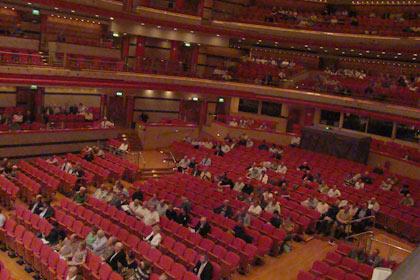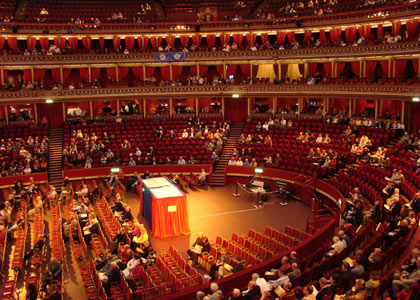4BR Talking Point - Brass to the Future
14-Jul-2009Ethnomusicologist Richard Jones looks at other banding traditions around the world to see if we can learn anything to help out own contesting future.
We all enjoy banding or we would not do it.
For many if not all brass band participants being a ‘bander’ is a way of life, something that shapes time, home life and in some instances working habits.
Integral to this way of life is the contest. Not wishing to delve too far down a lecture in brass band social performance and indeed social history, I want to highlight that it is the place and space rather than the format, which has and continues to aid diminishing audiences.

A matter of place and time: The British Open audience in 2007
As a person who has spent years looking at participating in bands as a research topic I have discovered the performance practices of other ‘brass band’ traditions and how these survive in our current globalised and popularised world.
Having recently taught a module on this very subject at Huddersfield University this topic is fresh in my mind and hopefully in the minds of those who took the module.
There are certain characteristics that define all cultures and aspects, including music, within those cultures. In British brass bands these characteristics include, as Trevor Herbert highlights, the ‘homogenised sound’, that bands create and the historical importance and significance of the contest.
For the Balkan brass band movement Garth Cartwright found that it was the association of bands to socially significant events such as weddings and funerals that made it significant, similarly this is the case made by Greg Booth in his study of Indian Wedding bands.
There are many other banding traditions that have this particular association with their own cultures, whether in New Orleans, Mexico or various places in the Far East.
Whilst most of these traditions do not have brass specific contests, some being accompanists for example, the Balkan brass band competition held at Gucha, near the village of Dragacevo in western Serbia has an approximate audience of 500,000 on an annual basis.
This festival as you may see if you look at the official web site is held outdoors, has stalls selling food, beer and band merchandise (does this sound familiar?) and bands appear on the stage for the formal contest but some appear unofficially away from the main event.
Having only read literature and experiences by others who have witnessed the event they all highlight that it is the general festival/competition as a social gathering which makes it successful and so enjoyable rather than the performance itself being of central significance.

A specialist audience? The Royal Albert Hall doesn't always attract the numbers
The focus of the ‘test match’ contests in this country are somewhat different to this Balkan perspective, the playing being the focal point for the audience than the social event, though players may have a different perspective on this.
There is nothing wrong with these events but being ‘placed’ in a specific out of the way or isolated world ‘space’ in major contest halls is basically the fundamental problem, specifically encouraging and perpetuating a ‘specialist audience’ that attend on an annual basis.
This is somewhat different to the perspective of the contest in the 19th century where bands were ‘placed’ outdoors and ‘spaced’ in the plain view of the general public, encouraging a broader category of listener.
This is a simplistic view on the change of contest space and place, issues such as the relevance of repertoire to the general population have a particular influence that would deserve discussing in detail on its own.
Nevertheless, Whit Friday and the other march contest remain the best vehicles to promote banding to a broader audience because they are inherently placed in settings which are open to more people who would not make the effort to go to an expensive concert hall hundreds of miles away.
The ‘test match’ contests are finding audiences difficult to attract, irrespective of the repertoire performed. If players who practice the piece prefer to socialise with each other in locations away from the hall why should complete strangers want to go to a contest?
Other than curiosity to witness a process and event that in all senses emits the perception of a Victorian museum culture, why would you pay and listen to 14 performances of the same piece if you do not have technical knowledge of playing or historical understanding of the band movement.
If there is indeed a need to have another contest in which bands are encouraged to participate it should be held outdoors in the (early, middle or late) summer (Whit Friday-esque), playing a varied programme of music (like Brass in Concert) and should be encouraged and advertised as a social event/festival rather than as a contest.
This kind of new event would be nothing new, just turn back the clock and see how it was done in the 19th century.
The format of additional contests, if we ideally we need anymore, certainly needs careful consideration but as I have highlighted here it should be the where rather than the how that should be of central concern.
Richard Jones BMus(hons) MA PhD
Ethnomusicologist, Composer, Lecturer




